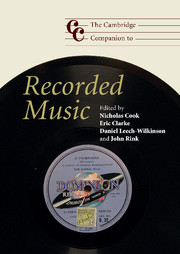Book contents
- Frontmatter
- Introduction
- Learning to live with recording
- A short take in praise of long takes
- 1 Performing for (and against) the microphone
- Producing a credible vocal
- ‘It could have happened’: The evolution of music construction
- 2 Recording practices and the role of the producer
- Still small voices
- Broadening horizons: ‘Performance’ in the studio
- 3 Getting sounds: The art of sound engineering
- Limitations and creativity in recording and performance
- Records and recordings in post-punk England, 1978–80
- 4 The politics of the recording studio: A case study from South Africa
- From Lanza to Lassus
- 5 From wind-up to iPod: Techno-cultures of listening
- A matter of circumstance: On experiencing recordings
- 6 Selling sounds: Recordings and the record business
- Revisiting concert life in the mid-century: The survival of acetate discs
- 7 The development of recording technologies
- Raiders of the lost archive
- The original cast recording of West Side Story
- 8 The recorded document: Interpretation and discography
- One man's approach to remastering
- Technology, the studio, music
- Reminder: A recording is not a performance
- 9 Methods for analysing recordings
- 10 Recordings and histories of performance style
- Recreating history: A clarinettist's retrospective
- 11 Going critical: Writing about recordings
- Something in the air
- Afterword: Recording: From reproduction to representation to remediation
- Notes
- Bibliography
- Discography
- Index
Raiders of the lost archive
Published online by Cambridge University Press: 28 September 2011
- Frontmatter
- Introduction
- Learning to live with recording
- A short take in praise of long takes
- 1 Performing for (and against) the microphone
- Producing a credible vocal
- ‘It could have happened’: The evolution of music construction
- 2 Recording practices and the role of the producer
- Still small voices
- Broadening horizons: ‘Performance’ in the studio
- 3 Getting sounds: The art of sound engineering
- Limitations and creativity in recording and performance
- Records and recordings in post-punk England, 1978–80
- 4 The politics of the recording studio: A case study from South Africa
- From Lanza to Lassus
- 5 From wind-up to iPod: Techno-cultures of listening
- A matter of circumstance: On experiencing recordings
- 6 Selling sounds: Recordings and the record business
- Revisiting concert life in the mid-century: The survival of acetate discs
- 7 The development of recording technologies
- Raiders of the lost archive
- The original cast recording of West Side Story
- 8 The recorded document: Interpretation and discography
- One man's approach to remastering
- Technology, the studio, music
- Reminder: A recording is not a performance
- 9 Methods for analysing recordings
- 10 Recordings and histories of performance style
- Recreating history: A clarinettist's retrospective
- 11 Going critical: Writing about recordings
- Something in the air
- Afterword: Recording: From reproduction to representation to remediation
- Notes
- Bibliography
- Discography
- Index
Summary
Every collector, whether of rare porcelain, jade or Old Masters, dreams of that one find that will astonish their peers and bring fame everlasting: their name will be spoken with bated breath for as long as there is interest in their field. Collectors of gramophone records are no different. For the instrumental enthusiast it might be a previously unknown recording of Johanna Martzy; the vocal collector may dream of finding the two fabled Fonotipia sides of the nineteenth-century tenor, Jean de Reszke. Whatever it may be, each and every collector has the belief that once in their lifetime he, or sometimes she (and it does seem that collecting is a male feature, or problem, depending on your point of view!), will make ‘the great discovery’ that will place them at the forefront of the craft.
At this juncture I must confess to being a ‘record collector’ – there, I've said it! My excuse is that I am a second-generation collector and my father inspired me with stories of his visits to Covent Garden to hear Supervia and Chaliapine (that's how it was spelt then): my earliest memories are of thorn needles being sharpened prior to wonderful sounds coming from an elaborate radio-gramophone. I still remember my first records when I can have been no more than five years old: a job-lot box from Morphet's sale room in Harrogate that included, oh joy of joys, Charles Penrose's ‘The Laughing Policeman’. That's probably why my professional life has revolved around records and recording for more years than I care to think. Love of the artists, and their performances, has been why I am in this strange business of ours. But although I had been on the receiving end of luck in finding interesting and sometimes rare records, I still awaited The Great Discovery.
- Type
- Chapter
- Information
- The Cambridge Companion to Recorded Music , pp. 177 - 180Publisher: Cambridge University PressPrint publication year: 2009



